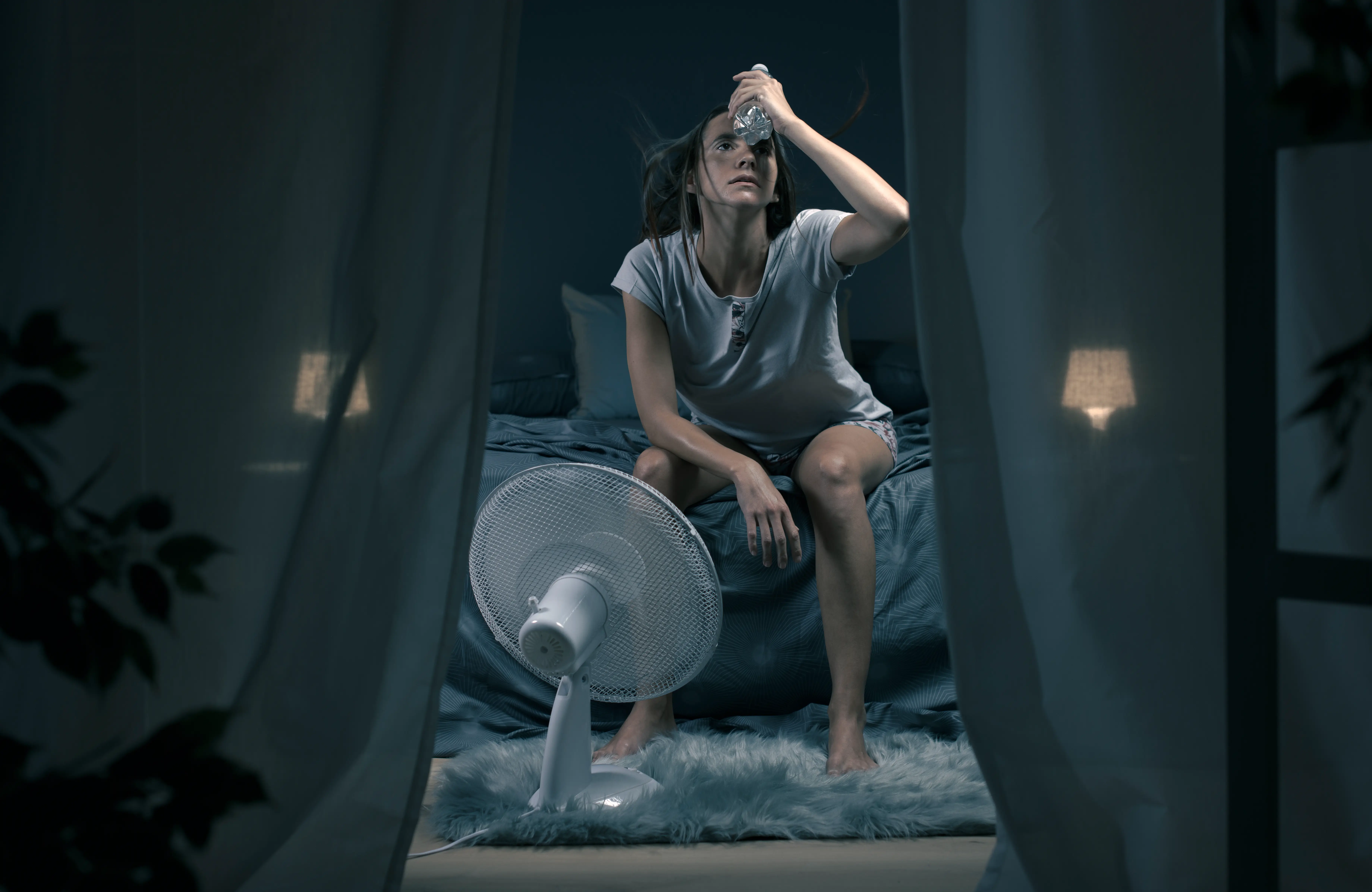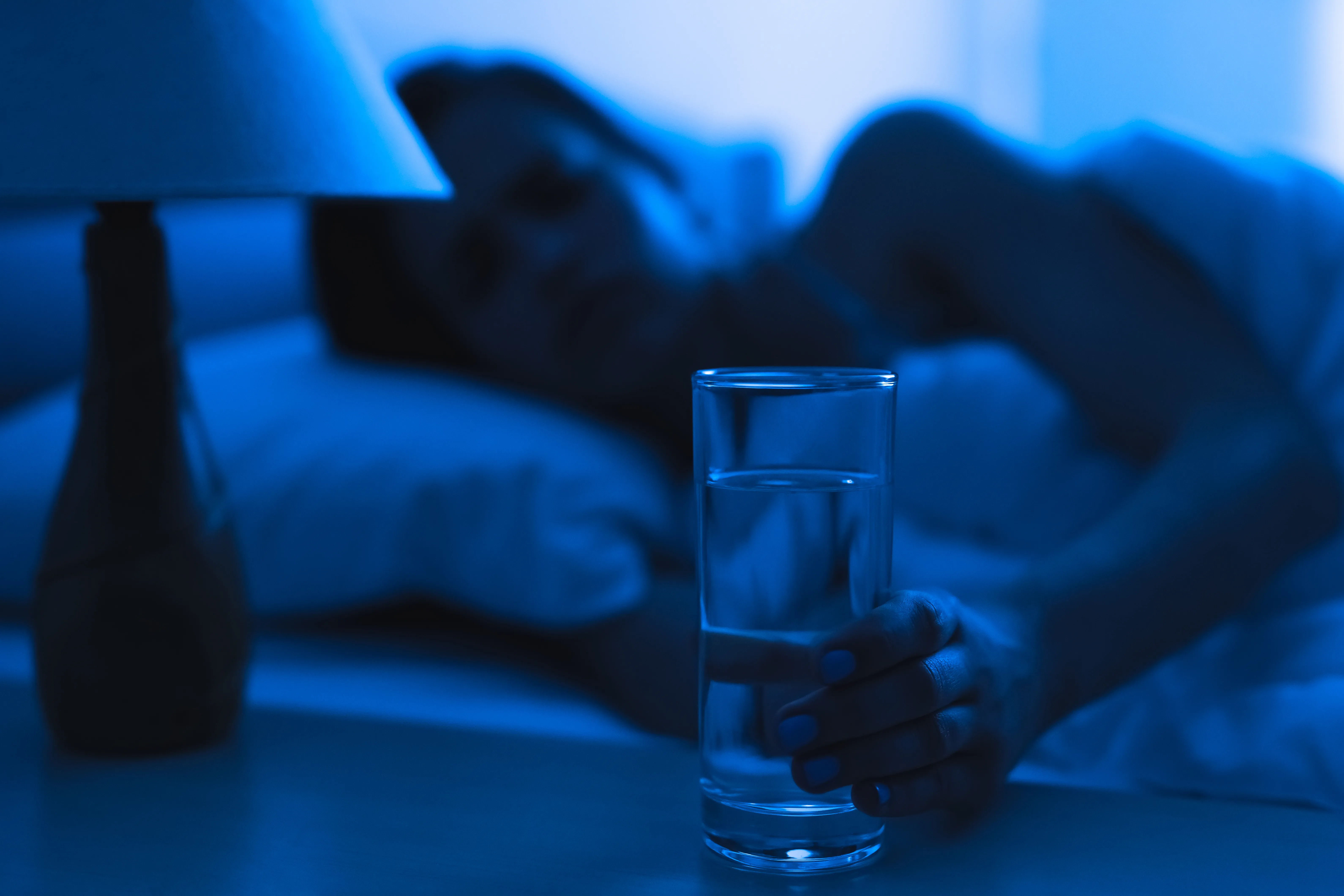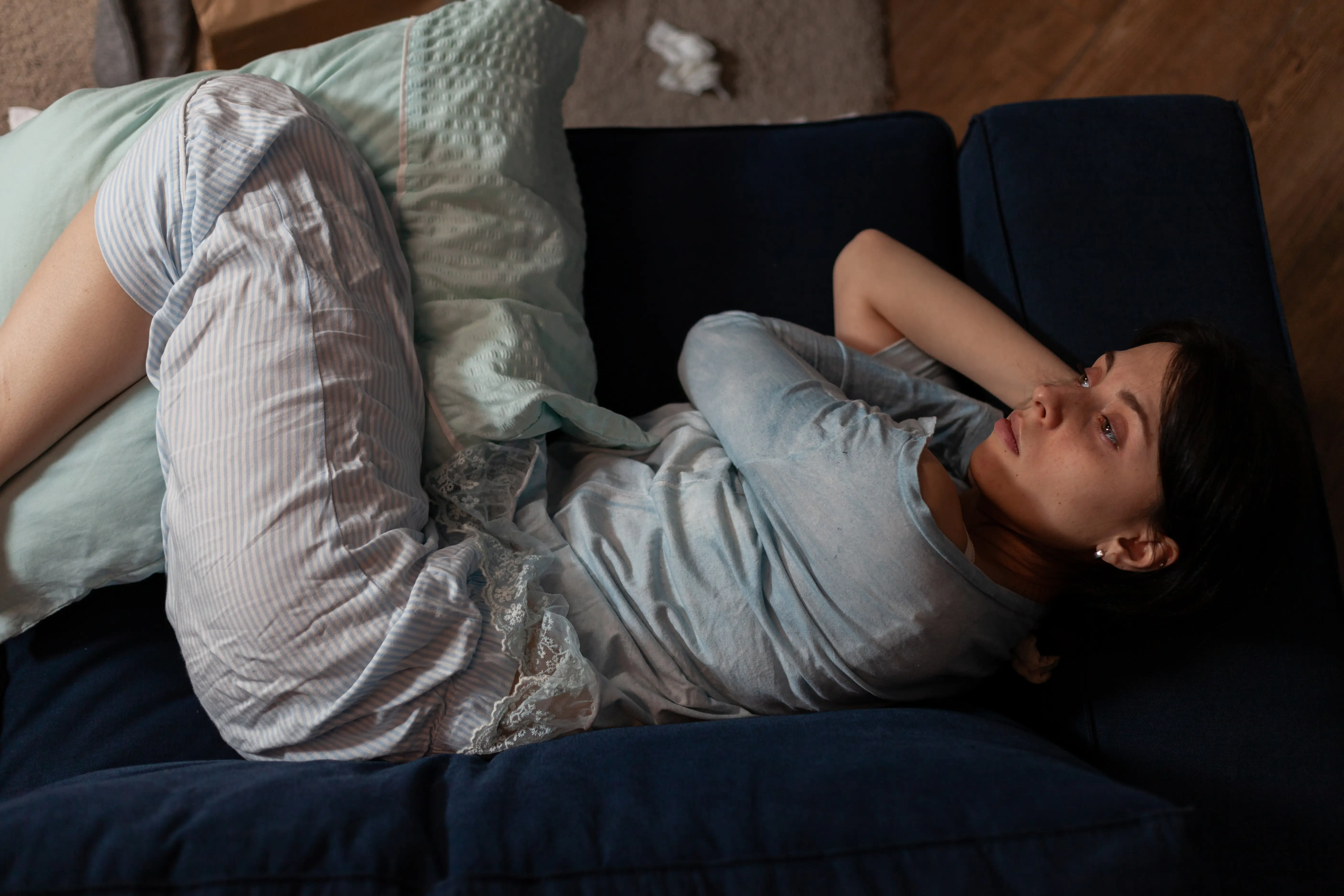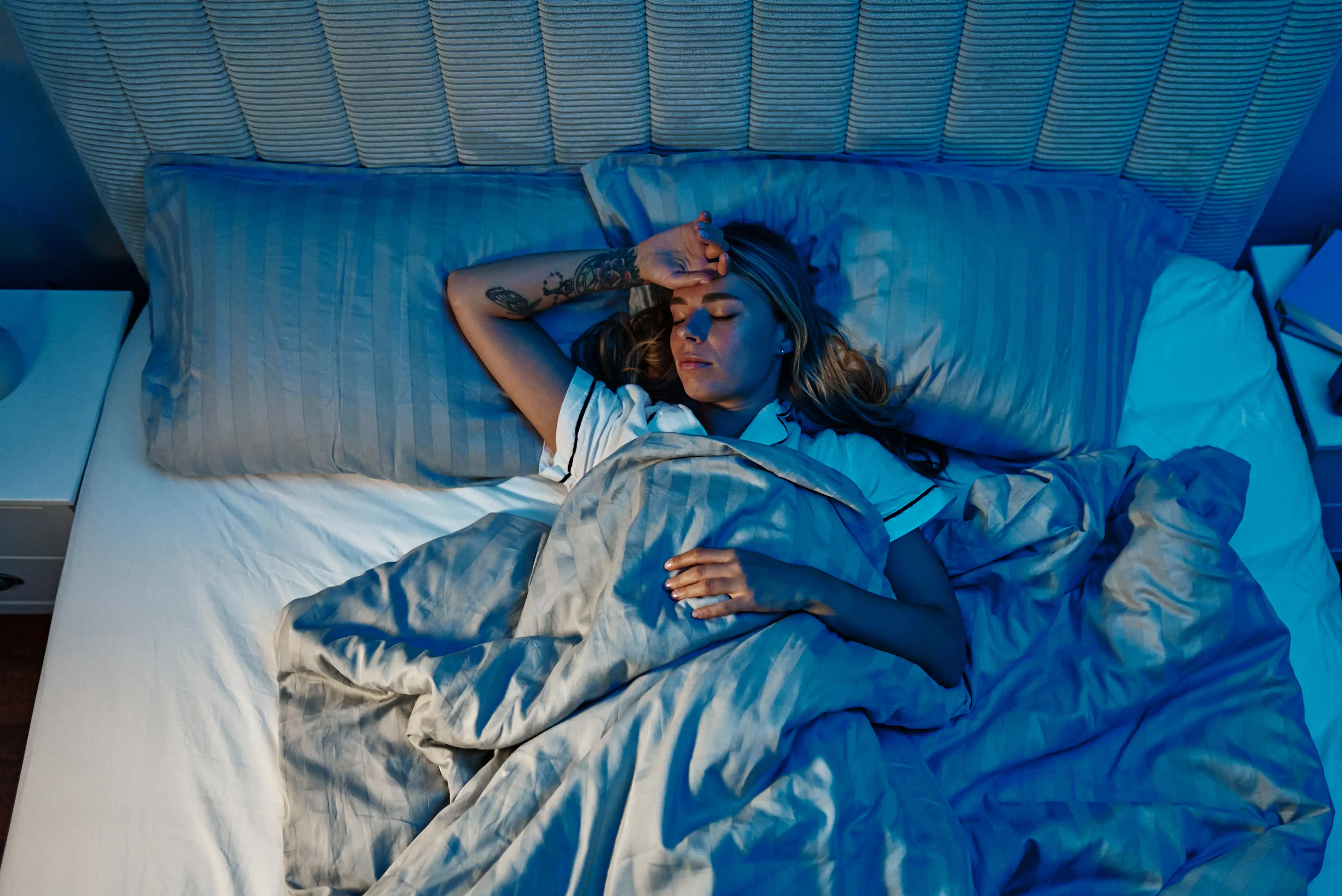Waking up in a sweat in the middle of the night can be frustrating, confusing, and alarming, especially when there's no clear reason. These episodes, often referred to as night sweats, can interfere with your rest, soak your sheets and sleepwear, and leave you feeling uncomfortable or anxious.
They can be a sign that something deeper is going on with your health. Whether you're experiencing them for the first time or dealing with them regularly, it's important to understand what night sweats are, how they differ from regular sweating, and what might be triggering them.
What Are Night Sweats?
Night sweats are episodes of excessive sweating during sleep, often soaking your clothes or bedding. They go beyond simply feeling warm; they can happen even in a cool room and are typically not related to external factors like room temperature or too many covers.
Night sweats can be linked to a range of causes, from hormonal changes to infections, medications, or more serious health concerns.
How Night Sweats Differ from Regular Sweating
Regular sweating is your body’s natural way of cooling down, usually triggered by heat, exercise, or stress.
In contrast, night sweats are spontaneous, intense, and often unrelated to external temperature. They occur during sleep and are usually excessive enough to wake you up or require changing your clothes or sheets.
What Causes Night Sweats

Night sweats can be caused by a wide range of factors, from common illnesses to more serious health conditions. One major category is infections, which can trigger your body’s immune response and raise your internal temperature, leading to excessive sweating during sleep.
Infections
Certain infections are well-known for causing night sweats, especially those that involve prolonged fever or inflammation.
- Tuberculosis: One of the most common infection-related causes of night sweats. TB often produces persistent fever, weight loss, fatigue, and drenching night sweats.
- HIV and Other Viral Infections: HIV can cause night sweats, especially in the early stages or when the immune system is weakened. Other viruses, like mononucleosis and cytomegalovirus (CMV), may also lead to night sweats as the body fights off infection.
- Bacterial Infections: Infections like endocarditis (infection of the heart lining), osteomyelitis (bone infection), or abscesses can all cause night sweats due to the body’s inflammatory response.
Medications
Certain medications can trigger night sweats as a side effect, either by affecting the body's temperature regulation or altering hormone levels.
- Antidepressants: Selective serotonin reuptake inhibitors (SSRIs) and other types of antidepressants are a common cause of night sweats. They can impact the brain’s neurotransmitters and disrupt your body’s ability to regulate temperature, leading to sweating during sleep.
- Hormone Therapy: Medications that involve estrogen or testosterone, often used during menopause or for gender-affirming care, can cause hormonal fluctuations that lead to night sweats. These are especially common during the adjustment period when hormone levels are shifting.
- Fever-Reducing or Blood Pressure Medications: Drugs like aspirin or acetaminophen can sometimes lead to sweating as they break fevers. Similarly, certain blood pressure medications (especially beta blockers) may affect the nervous system in a way that triggers night sweats as a side effect.
Chronic Conditions
Several chronic illnesses can cause night sweats by disrupting your body’s normal functions or triggering inflammation.
- Diabetes: Low blood sugar (hypoglycemia) during the night can cause sweating as the body reacts to restore glucose levels. Poorly controlled diabetes may also increase infection risk, which can lead to night sweats.
- Hyperthyroidism: An overactive thyroid gland speeds up metabolism and increases the body’s heat production. This heightened metabolic rate can make you sweat excessively, including during sleep. Other symptoms like rapid heartbeat and weight loss often accompany night sweats in hyperthyroidism.
- Certain Types of Cancer: Night sweats can sometimes be an early warning sign of cancers such as lymphoma or leukemia. These cancers trigger the immune system to release chemicals called cytokines, which can cause fevers and drenching night sweats. It’s important to note that night sweats alone don’t mean cancer, but when combined with other symptoms like unexplained weight loss or persistent fatigue, they warrant medical attention.
- Autoimmune Diseases: In diseases like rheumatoid arthritis and lupus, the immune system attacks the body’s tissues, causing chronic inflammation. This inflammation often leads to feverish episodes and night sweats as the body fights the autoimmune reaction.
Anxiety-Induced Night Sweats
Emotional and psychological stress doesn’t just affect your mind; it can also cause physical symptoms like night sweats through the body’s stress response system.
- Panic Attacks During Sleep: Panic attacks can happen while you’re asleep, causing sudden waves of intense fear accompanied by rapid heartbeat, shortness of breath, and heavy sweating. These attacks can abruptly wake you up, often leaving you drenched in sweat.
- Generalized Anxiety Disorder: Chronic anxiety keeps your body in a heightened state of alertness. This constant activation of your nervous system triggers excessive sweating as your body perceives a threat even when there’s none, making night sweats a frequent problem for people with anxiety disorders.
- Overactive Fight-Or-Flight Response: When your body's fight-or-flight system is overly sensitive or frequently activated, it floods your body with stress hormones like adrenaline and cortisol. These hormones increase heart rate and blood flow, causing sweating as part of the body's natural preparation to respond to danger, even during restful sleep.
Sleep Disorders
Disruptions to normal sleep patterns can interfere with how your body regulates temperature and stress responses, causing night sweats.
- Obstructive Sleep Apnea (OSA): OSA is a condition that causes repeated pauses in breathing during sleep, lowering oxygen levels and increasing heart rate. These episodes often trigger the body’s stress response, which can lead to sudden sweating and waking up feeling drenched.
- REM Sleep Behavior Disorder: In this disorder, the normal paralysis during REM sleep is absent, causing people to physically act out their dreams. This increased movement and muscle activity can raise body temperature, leading to excessive sweating during the night.
- Restless Leg Syndrome: The uncomfortable sensations and involuntary leg movements in restless leg syndrome disrupt sleep and increase overall physical activity at night. This can cause increased metabolic activity and sweating episodes.
Stimulants
Common substances we consume daily can influence your nervous system and body temperature regulation, sometimes resulting in night sweats.
- Alcohol Consumption: Alcohol causes blood vessels to widen (vasodilation), which increases heat loss but paradoxically makes you feel hot and sweat more. Drinking alcohol close to bedtime can disrupt your sleep cycle and trigger night sweats, especially as your body metabolizes the alcohol.
- Caffeine Intake: As a central nervous system stimulant, caffeine increases heart rate and metabolic activity. Consuming caffeine late in the day can make it harder to fall asleep and raise your body’s baseline temperature, both of which may contribute to sweating during the night.
Night Sweats in Men
Night sweats in men are common and can sometimes signal changes in hormone levels, particularly testosterone. While many people associate night sweats with women going through menopause, men can experience similar symptoms due to fluctuations in their hormones or other health factors.
How Testosterone Affects Sleep Quality
Testosterone plays a key role not only in male reproductive health but also in regulating sleep patterns and overall well-being. Healthy testosterone levels help maintain deep, restorative sleep phases, especially REM and slow-wave sleep, which are crucial for physical recovery and mental health.
When testosterone levels decline, a natural part of aging or due to medical conditions such as hypogonadism, men may experience disrupted sleep, which can include frequent awakenings and night sweats.
Low testosterone can also contribute to other sleep disorders, such as obstructive sleep apnea, which itself causes night sweats due to repeated breathing interruptions and stress on the body.
In addition, testosterone influences the body's temperature regulation. Fluctuations or declines in this hormone may cause the body's thermostat to become more sensitive, triggering episodes of sweating during the night even without external heat.
Night Sweats in Women

Night sweats are especially common in women due to hormonal fluctuations throughout different stages of life. Changes in estrogen and progesterone levels can disrupt the body’s temperature regulation, often leading to episodes of intense sweating during sleep.
Menopause
Menopause is one of the most common causes of night sweats in women. As estrogen levels drop during this phase, the body’s temperature control system becomes less stable.
This can cause sudden hot flashes that extend into the night, resulting in heavy sweating that disrupts sleep. These night sweats can last for several years and vary in intensity and frequency.
Pregnancy
Pregnancy brings significant hormonal and metabolic changes that can trigger night sweats.
Increased progesterone and higher metabolism to support the growing fetus raise body temperature, which can cause excessive sweating during sleep. Additionally, pregnancy-related anxiety or discomfort may contribute to night sweats.
Perimenopause
Perimenopause is the transitional period before menopause when hormone levels start fluctuating but have not yet stabilized at low levels.
During this time, irregular estrogen and progesterone surges can cause unpredictable night sweats. Women may experience these symptoms years before actual menopause begins.
Postpartum Hormonal Shifts
After childbirth, hormone levels drop rapidly, especially estrogen and progesterone. This sudden change can lead to night sweats, which may be further influenced by breastfeeding, sleep deprivation, and stress. Postpartum night sweats are usually temporary but can be intense as the body readjusts.
Guide to Managing Night Sweats

Managing night sweats often starts with simple lifestyle changes that help regulate your body temperature and reduce triggers. These adjustments can improve your sleep quality and reduce the frequency or intensity of sweating episodes.
Lifestyle Adjustments
- Cool Your Sleep Environment: Keep your bedroom cool and well-ventilated. Use fans or air conditioning if possible, and opt for lightweight, breathable bedding made from natural fabrics like cotton or linen. Lowering the room temperature can help prevent overheating, which reduces sweating during the night.
- Avoid Triggers: Certain foods, drinks, and habits can worsen night sweats. Limit spicy foods, caffeine, and alcohol, especially in the evening, as they can increase body temperature and stimulate your nervous system. Also, avoid heavy meals close to bedtime and try to manage stress through relaxation techniques like meditation or deep breathing.
- Stay Hydrated: Sweating causes fluid loss, so it’s important to drink enough water throughout the day to stay hydrated. Proper hydration helps regulate your body temperature and supports overall health, making it easier to recover from night sweats and avoid dehydration-related symptoms.
Medical Treatments
- Hormone Replacement Therapy (HRT): HRT is often prescribed for women going through menopause to balance declining estrogen levels. It can significantly reduce night sweats and hot flashes by stabilizing hormone fluctuations. However, HRT isn’t suitable for everyone, so it’s important to discuss risks and benefits with a healthcare provider.
- Medications for Underlying Conditions: If night sweats are caused by infections, chronic illnesses, or medications, treating the root cause is key. For example, antibiotics can clear infections like tuberculosis, and adjusting medications that cause sweating as a side effect may be necessary. Sometimes doctors may also prescribe certain drugs, like antidepressants or anticonvulsants, off-label to reduce night sweats in specific cases.
When to See a Doctor

While occasional night sweats can be normal, certain signs indicate it’s important to seek medical advice to identify and address any underlying health issues.
- Persistent or Severe Night Sweats: If night sweats happen frequently over several weeks or become so intense that they soak your bedding and disrupt your sleep, it’s a good idea to consult a doctor. Persistent night sweats may signal an underlying medical condition that requires diagnosis and treatment.
- Accompanied by Other Symptoms: Night sweats combined with unexplained weight loss, fever, fatigue, coughing, or swollen lymph nodes could be signs of infections, cancers, or other serious illnesses. Don’t ignore these warning signs; prompt medical evaluation is essential.
- Impact on Daily Life: When night sweats interfere with your ability to get restful sleep, causing daytime tiredness, irritability, or concentration problems, it’s time to talk to a healthcare professional. Improving sleep quality is crucial for overall health and well-being.
FAQS
What Causes Night Sweats?
Night sweats can result from infections, hormonal changes, chronic diseases, anxiety, sleep disorders, medications, and lifestyle factors. They often reflect how the body regulates temperature or reacts to stress and illness.
How Can I Manage Night Sweats?
Manage night sweats by keeping your bedroom cool, avoiding triggers like spicy foods and caffeine, staying hydrated, and practicing good sleep hygiene. Medical treatments may be needed for hormone imbalances or underlying health issues.
Can Night Sweats Be a Sign of Serious Illness?
Yes, persistent night sweats with symptoms like weight loss or fever can indicate serious conditions such as infections or cancer. See a doctor if night sweats are frequent or accompanied by other concerning signs.
Conclusion
Night sweats can result from many causes, from hormones to health conditions. Occasional sweating is normal, but frequent or severe night sweats with other symptoms need medical attention. Lifestyle changes can help, but treatment depends on the cause. Knowing when to seek help is key to better sleep and health.
Dom Abraham
As the lead content writer at Sleepiverse. Dom pours his heart into writing mattress reviews, bedding product reviews, and medically-reviewed health articles. Dom is from Portugal and likes to spend his free time writing on the beach as it gives him a sense of comfort. Aside from writing mattress reviews in front of the soothing beach view, Dom likes to experiment with new amazing food ideas.


